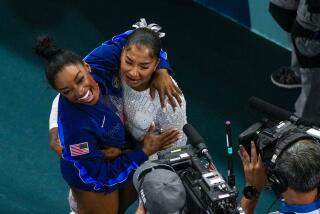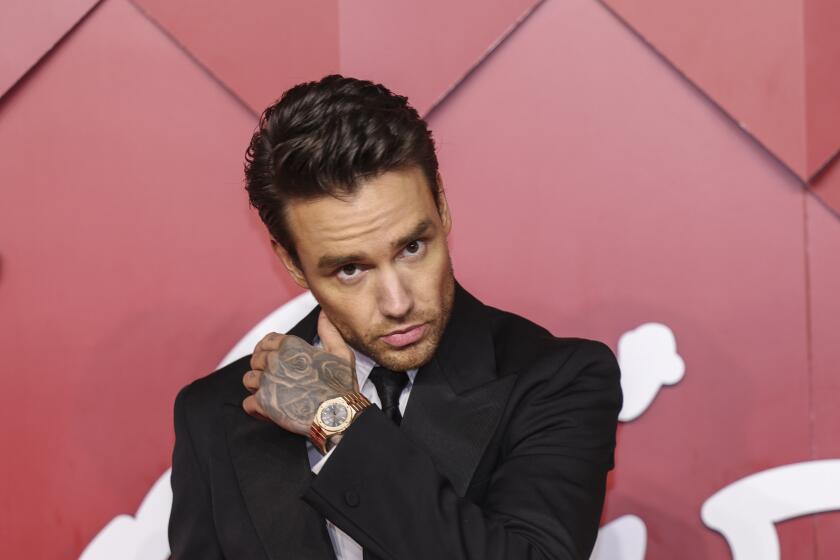A Fast Break for Kids : Jazz Sports LA Unites the Sports, Arts and Business Worlds in Helping High School Students Realize Musical Dreams
It was a typical Show Time night at the Forum. The lights were bright, the crowd was coming alive and the Lakers were ready to roll.
Center court was filled, not with the purple and gold of the Lakers, but with a group of starry-eyed kids with musical instruments. As the downbeat began for the “Star-Spangled Banner,” the musicians--all from local high schools--were joined by a jovial Herbie Hancock, a portable keyboard slung over his shoulder. The playing was young, enthusiastic and vigorous, richly colored by Hancock’s soaring synthesizer lines, and the Laker fans reacted with the kind of spirited cheering once reserved for the ball-handling of Magic Johnson or one of Kareem Abdul-Jabbar’s classic skyhooks.
Abdul-Jabbar, watching from the sidelines on this November night, smiled proudly at the performance of the young musicians. He is now the chairman of Jazz Sports LA, an outreach project that brings basketball and jazz together in support of music education programs at two L.A. city schools-- Alexander Hamilton High School and Alain Locke High School.
Abdul-Jabbar sees striking similarities in the interaction that takes place between the five members of a jazz quintet and the five players on a basketball team.
“Look at it this way,” he says. “The whole idea is that the solos are basically the same as the ball going from one player to another on the basketball team. The jazz players pass the solo spotlight amongst and between themselves the way the basketball players pass the ball. And in both cases, it only works when it’s about teamwork.”
Jazz Sports LA returns to the Forum this afternoon, when the Locke Multi-School band--a collection of musicians from various high schools within the Los Angeles Unified School District--will perform as part of a Martin Luther King Day celebration taking place in conjunction with the Lakers-Miami Heat game. The band will be conducted by Gerald Wilson, the noted composer, orchestra leader and 1996 Grammy Award nominee, in a concert before the game and in a performance of the national anthem.
The event, which begins with the band’s performance on a stage outside the Forum Club entrance at 12:30 p.m., also includes an exhibition of never-before-seen photography depicting historical events in the life of Martin Luther King Jr.
The energizing force behind Jazz Sports LA is the Thelonious Monk Institute of Jazz--an organization that is becoming one of the country’s most prominent supporters of jazz. Nine years ago, the institute created the annual International Jazz Competition, an event that has been won by such now-prominent players as Joshua Redman, Jacky Terrason and Marcus Roberts.
Among the foundation’s other activities are the Monk Institute of Jazz Performance, a two-year program in jazz education at the New England Conservatory; a four-day festival--JazzFest USA--that will bring 2,500 high school students to Universal Studios, Orlando, for a four-day event; and Jazz in the Classroom, an innovative series of educational meetings between young people and well-known jazz artists. Plans reportedly are underway for a nationally televised broadcast of the Monk Competition in November, when the event celebrates its 10th anniversary. Jazz Sports LA, however, involves more than the Monk Institute, and is a unique example of creative synthesis of the sports, artistic and commercial communities. The other prime backers are the National Endowment for the Arts and Nissan Motor Corp., U.S.A.
The Monk Institute, under the direction of Thelonious Monk Jr., son of the legendary jazz pianist and a prominent jazz drummer and bandleader himself, consistently has sought to finance its numerous programs with similar coalitions.
“Our relationship with the NEA goes back to around 1989,” Monk explains. “We were both operating around Washington, D.C., but we decided we didn’t want to be like every other organization and hit on the NEA for a million dollars. We’ve asked for a few small emergency grants, and we’ve gotten them, but that’s been it for funding.”
The Monk Institute tried, instead, to come up with programs that were attractive to the NEA, to corporate America and to the jazz community.
“Although the NEA doesn’t supply the majority of our funding,” adds Monk, “it’s the most substantive arts organization in the country, and it obviously gives Jazz Sports LA some real credibility. Nissan has been very generous with the funding they’ve provided. We know how to deal with jazz, and the Lakers certainly know about basketball. So it’s a partnership that works very well, with each partner contributing what it can do best.”
The value of such coalitions, at a time when budgetary provisions for extracurricular activities in the nation’s secondary schools are rapidly drying up, is manifest. Monk sees the alliances as at least one viable response to the fire that has been leveled at the NEA.
“There’s no doubt that the NEA has taken a lot of hits since Jane Alexander became the director,” he says, “which is a shame, since she brings a really strong and valuable connection with the creative community. Her role in the development of Jazz Sports LA has been vital.”
Each participant in Jazz Sports LA sees jazz as a vital expression of the essence of American society.
“That’s exactly why we’re here,” says Jerry Valentine, a spokesman for Nissan. “Because we believe that music in general, and jazz in particular, are very much a part of the American psyche.
“An organization like Jazz Sports LA allows us to take jazz, this great American treasure, into the secondary schools, and not only get our young people knowledgeable about it, but get them involved with it, as well.”
Monk agrees, stressing, in typically pragmatic fashion, his belief in the far-reaching value of an education in jazz music.
“A young pianist or saxophonist or drummer who studies jazz,” he explains, “has all kinds of options. It may not mean that they’re going to become the next John Coltrane, but it does mean that they’ll be able to play any kind of gig that comes along. Because jazz education is education in American music.”
The high school students who take the stage at this afternoon’s Forum programs aren’t yet prepared to become John Coltrane or perform in the recording studios and the Broadway orchestra pits. But, because of the opportunities afforded by Jazz Sports LA, all of those possibilities become plausible scenarios for kids whose hopes and dreams might not otherwise reach beyond the limits of their neighborhoods.
The Forum appearances--there will be four more this year--are only the tip of the Jazz Sports LA operation. The program’s fundamental, nitty-gritty activities take place weekly in the lower visibility arenas of the Locke and Hamilton high school campuses.
“We send six musical coaches to each school between three and four a week to work one-on-one with the music students,” says Barbara Sealy, one of the West Coast directors of the Thelonious Monk Institute of Jazz. “The coaches, who are paid a minimal stipend, are such well-known musicians such as trumpeter Bobby Rodriguez and drummer Ndugu Leon Chancler. And sometimes we’ll send in a Herbie Hancock or a Kevin Eubanks or a Charlie Haden.”
In addition to the musical coaches, Jazz Sports LA also occasionally furnishes instruments, music supplies and transportation to events.
Because the Institute is careful to work with projects that Monk describes as “doable,” only two schools were chosen for the Jazz Sports LA’s first year of activity. Funding was provided, on a reportedly equal basis, by the Institute and Nissan on a pilot program foundation, with plans in place for further expansion.
Abdul-Jabbar, whose father was a Juilliard-trained trombonist, and who professes to having wanted to play the piano (“but I wouldn’t practice”), is especially supportive of the goals of Jazz Sports LA.
“Jazz and basketball,” says Jabbar, “both say something about America. We’re a group of individuals, but we’re still a team.”
More to Read
The biggest entertainment stories
Get our big stories about Hollywood, film, television, music, arts, culture and more right in your inbox as soon as they publish.
You may occasionally receive promotional content from the Los Angeles Times.










